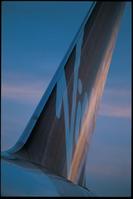Virgin Atlantic becomes first to fly on biofuel
 Virgin Atlantic, one of the world’s leading long-haul airlines, yesterday flew one of its Boeing 747 jumbo jets on biofuel from London Heathrow to Amsterdam – becoming the first airline in the world to fly on renewable fuel.
Virgin Atlantic, one of the world’s leading long-haul airlines, yesterday flew one of its Boeing 747 jumbo jets on biofuel from London Heathrow to Amsterdam – becoming the first airline in the world to fly on renewable fuel. Together with partners Boeing, GE Aviation and Imperium Renewables, Virgin Atlantic is helping to pioneer renewable fuel sources for aviation.
The Virgin Atlantic aircraft, flight number VS811P and registration GV-WOW, flew using a biofuel composed of babassu oil and coconut oil. These oils are environmentally and socially sustainable. They can both be found in everyday cosmetic products, such as lip balm and shaving cream, and do not compete with staple food sources. In addition, the babassu nuts and coconuts were harvested from existing, mature plantations. No modifications were made to either the aircraft or its engines to enable the flight to take place.
The demonstration flight, piloted by Captain Geoff Andreasen, Virgin Atlantic’s Chief Boeing pilot, took off from London Heathrow at 11.30am and arrived in Amsterdam at 13.30 local time. During the flight, technical advisors on board were taking readings and recording flight data for later analysis.
Commenting on the first ever airline flight using biofuel, Sir Richard Branson, the President of Virgin Atlantic, said:
“Today marks a biofuel breakthrough for the whole airline industry. Virgin Atlantic, and its partners, are proving that you can find an alternative to traditional jet fuel and fly a plane on new technology, such as sustainable biofuel. This pioneering flight will enable those of us who are serious about reducing our carbon emissions to go on developing the fuels of the future, fuels which will power our aircraft in the years ahead through sustainable next-generation oils, such as algae.”
In preparation for the flight, Boeing, GE Aviation and Imperium conducted extensive laboratory and static-engine testing on the ground to evaluate the energy and performance properties of the biofuel used in the flight. The Virgin Atlantic flight is the first step in a broader industry-wide initiative to commercialise alternative fuel sources for aviation and Virgin Atlantic will be sharing the results with those also seeking to cut their carbon emissions in the rest of the industry.
Marlin Dailey, Boeing Commercial Airplane’s Vice-President of Sales, Europe, Russia and Central Asia, added:
“Today’s flight is a continuation of a journey we embarked on last year with Sir Richard and Virgin Atlantic to identify more sustainable forms of fuel for the aviation industry. Change begins with a vision. Following that, innovation and technologies are essential to proving the feasibility of renewable, alternative fuel sources for an environmentally progressive future of aviation. We commend Virgin Atlantic for their efforts to move that vision forward for the betterment of all of us.”
Dr. Tim Held, Manager of Advanced Combustion Engineering at GE Aviation, for GE Aviation, commented:
“The partnership between Virgin Atlantic, Boeing, GE and Imperium Renewables has advanced our understanding of biofuels for aviation applications. Prior to this historic flight, the engine ground testing conducted by GE and CFM International required no hardware modifications to the engine, and the fuels performed as expected. The team entered today’s historic flight demonstration with great confidence.”
John Plaza, President and CEO for Imperium Renewables commented:
“We’re extremely proud to have produced the fuel used today for this historic flight. A successful flight will not only validate the use of biofuels in aviation, but also provide a glimpse into the future of all fuels. Today’s biojet fuel offers higher-quality standards and a more sustainable fuel than traditional jet fuel. Additionally it illustrates the potential for “second generation” biojet fuel to be even more viable in the coming years. We’re commited to the aviation community and to innovating new and environmentally-friendly alternative fuels.”
The results of the biofuel flight will be analysed by Virgin Atlantic, Boeing, GE Aviation and Imperium Renewables and used for the research and development of next-generation biofuels that can help reduce carbon emissions. Boeing will use the findings from this flight in another demonstration flight later this year.
Babassu oil comes from the nuts of the babassu tree, which is native to Brazil. The fruit of the babassu is used in products such as drugs and cosmetics, and its leaves are used to make roofs and paper, which in turn is used to create folders, bags and soap boxes. Coconut oil is used for a variety of applications including oil for biodiesel. Most coconut plantations are mature and do not contribute to deforestation.

